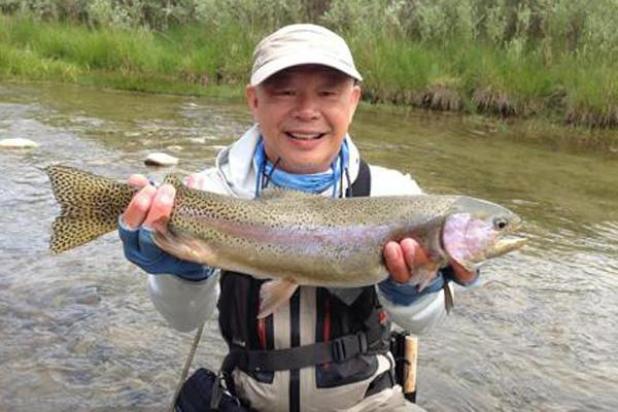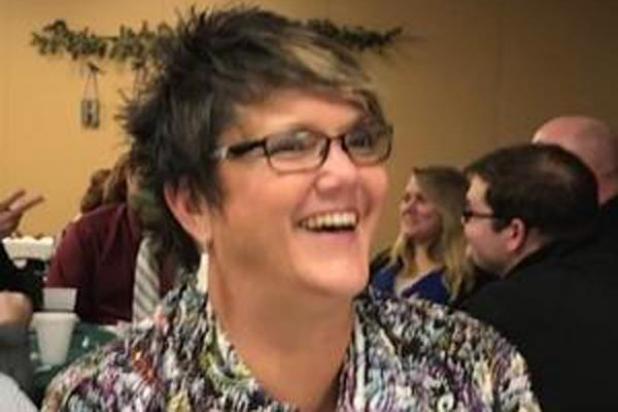
Melissa Memorial Hospital pharmacist Kwei Leong died Oct. 21 from COVID-19. His wife, Mhyong Cha, said he was generous and caring and loved to share food with his co-workers. And he loved fly-fishing.

Elke Peterson worked in the business office of Melissa Memorial Hospital. She contracted the coronavirus on Sept. 17 and died in the hospital just over three weeks later.
‘We’re stretched to the max’
Winter is coming, COVID-19 is accelerating at an alarming pace in Colorado, and the state’s 43 rural hospitals continue to struggle through debilitating staff shortages.
Employees have left small-town health care facilities, complaining of burnout, and now that vaccine mandates are in place, some have quit over being forced to receive the shot.
In one rural hospital, a pharmacist and a business office employee died of COVID-19 within a week of one another, leaving co-workers at Holyoke’s Melissa Memorial Hospital grief-stricken and overworked as those positions remained unfilled at the time of this interview.
“They died very tragically,” said MMH CEO Cathy Harshbarger. “Both required a lot of support and medical care. We had to ship them out to other hospitals for care. We’re stretched to the max.”
MMH has run a help wanted ad in The Holyoke Enterprise for 10 openings including a dietary cook, a paramedic and an EMT. The hospital has a separate ad for an executive director to lead its hospital foundation.
“More and more my employees are asking, ‘Why am I in health care?’” said Harshbarger.
The most recent numbers from the Colorado Department of Public Health and Environment show that a third of the state’s hospitals are bracing for ICU bed shortages and nearly 40% of them are anticipating staff shortages.
Last month, administrators at Rangely District Hospital had to ask employees to pitch in when five of its certified nursing assistants, almost the entire department, came down with the virus at once. Rangely is a 25-bed critical care facility on the Western Slope that includes a long-term care swing bed wing.
Long-haul COVID-19 is also a problem with health care workers who may have initially been infected from front-line duty. In Hugo at Lincoln Community Hospital and Nursing Home, CEO Kevin Stansbury said long-haul symptoms have struck some of his youngest and healthiest employees, who now can’t work the hours they used to.
“We have a physician’s assistant who is in her mid-30s. She has days where the fatigue has beaten her down,” said Stansbury. “Some days she can’t get out of bed.”
Stansbury said after nearly two years of COVID-19 care plus the normal patient load, nerves are frayed beyond belief. “Nurses are not only dealing with death but with the grumpy relatives of patients who have denied the existence of the disease. Now the patient has the disease and people can’t go into the room. That causes stress, and they take it out on my staff. Some people in health care are saying, ‘I can’t do it anymore.’”
According to a national study of 1,000 people by Morning Consult, one in five health care workers have quit their jobs because of burnout and poor pay since the pandemic started. Of those who are still working, a third have considered leaving. Cara Welch, spokeswoman for the Colorado Hospital Association, says these numbers are reflected in Colorado as well.
Before COVID-19, keeping medical personnel happy in small out-of-the-way communities was a challenge, but losing nearly 20% of the workforce on top of that has rural hospital administrators worried. Temporary hiring agencies are filling that void, but traveling health care workers are expensive, sometimes charging many times more than what full-time hospital staff members make.
David Engle, who runs the Southeast Colorado Hospital District in Springfield, said temporary staffing companies are charging up to $190 per hour for a traveling nurse and $90 per hour for a certified nursing assistant, which Stansbury said is twice the normal rate.
“We’ve been bare bones before COVID, and it’s making it more challenging,” said Stansbury, adding that the district has advertised for two weeks for a director of nursing for his 15-bed hospital and “we’ve gotten crickets.”
Kyle Ren, CEO of Rangely District Hospital, said he’s seen prices upward of $225 per hour to hire a temporary registered nurse. He predicts the situation will get worse before it gets better.
“The locum coverage is a temporary fix and not sustainable for a rural hospital,” said Ren. “I don’t have a crystal ball in front of me, but I can see behind me, and it has been a long couple of years.”
Ren reminds his staff that they have health benefits and stability in their jobs, which often doesn’t apply with temporary work.
The hospital in Holyoke is attempting to fill two positions left empty when pharmacist Kwei Leong and office administrator Elke Peterson died of COVID-19 within a week of each other.
Leong was filling in for a woman who was on maternity leave, making the commute to Holyoke from Centennial weekly. In a newspaper article announcing that he was joining the hospital staff, he said he enjoyed taking care of people, adding that he loved rural communities. “Small towns have so much character,” he said.
Peterson, 60, entered the hospital with COVID-19 on Sept. 17 and died just over three weeks later.
Harshbarger wouldn’t say whether Leong and Peterson were vaccinated, but it was obvious they were coming down with something.
“They were confused from lacking oxygen and went home sick. Then they realized they were in bigger trouble,” said Harshbarger. “They were scared. Their families were scared.”
One of the employees was in dire need of a specialist and was flown to a larger hospital. “We keep people overnight. But if they start having extreme breathing problems, if they start losing arterial blood flow, they need a specialist. We have to chopper them out,” said Harshbarger.
It’s been a challenge finding a bed in larger hospitals, and Harshbarger said there are times when they call hospitals as far away as Missouri, Nebraska, Utah and Kansas before they find a place with enough space to take a patient hovering between life and death.
Ren was an EMT when he applied for and landed the CEO position at Rangely District Hospital in January 2020. When COVID-19 hit in Colorado two months later, four of his EMTs came down with the virus. Ren went from CEO to responding to medical emergencies in an ambulance.
“In a rural setting like this, we chip in. We have to wear multiple hats,” said Ren.
In small towns like Rangely, Springfield, Hugo and Holyoke, health care workers care for their neighbors. And when they become casualties themselves, the loss becomes more personal than it does in the big city.
“It’s a battle. The loss of our staff has been hard on everyone,” Harshbarger said.
She has called for flags to be flown at half-staff to honor a hometown pharmacist and business office manager as heroes.
